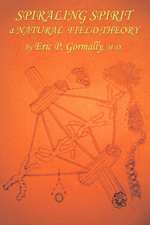Evolution of Human Behavior
Autor Agustin Fuentesen Limba Engleză Paperback – 11 dec 2008
Preț: 579.21 lei
Preț vechi: 740.73 lei
-22% Nou
Puncte Express: 869
Preț estimativ în valută:
110.84€ • 115.07$ • 92.43£
110.84€ • 115.07$ • 92.43£
Carte tipărită la comandă
Livrare economică 11-17 martie
Preluare comenzi: 021 569.72.76
Specificații
ISBN-13: 9780195333589
ISBN-10: 0195333586
Pagini: 316
Ilustrații: 15 ht, 16 lines
Dimensiuni: 152 x 231 x 15 mm
Greutate: 0.43 kg
Editura: Oxford University Press
Colecția OUP USA
Locul publicării:New York, United States
ISBN-10: 0195333586
Pagini: 316
Ilustrații: 15 ht, 16 lines
Dimensiuni: 152 x 231 x 15 mm
Greutate: 0.43 kg
Editura: Oxford University Press
Colecția OUP USA
Locul publicării:New York, United States
Recenzii
The approach is well thought out and Fuentes is one of the few scholars in our field who could pull it off. . . . I venture to say it might put a new face on our approach to this complex and contentious topic.
The thorough and careful discussion of the different approaches used in the study of human behavior . . . should be very useful for students. . . . The examples used are particularly good in illustrating how research in these areas is done.
The book's strength is its accessible yet rigorous intellectual synthesis of various approaches to the evolution of human behavior. A number of ideas floating in the literature, at conferences, and within scholars' heads are concisely and clearly represented in this book. Some of the theoretical directions that evolutionary approaches are likely to take can also be found here. . . . [The book] will marvelously serve the reader seeking a sophisticated, yet accessible overview of adaptive frameworks guiding our understanding of human behavior.
Fuentes succeeds in providing not only just a thorough review of the explanations for human behavioral evolution, both past and present, but also an informative commentary on the strengths and weaknesses of each and on the importance of understanding our evolutionary history. . . . Given the synthetic nature of the book, it covers a broad range of material, and instructors will find it to be a valuable resource.
The thorough and careful discussion of the different approaches used in the study of human behavior . . . should be very useful for students. . . . The examples used are particularly good in illustrating how research in these areas is done.
The book's strength is its accessible yet rigorous intellectual synthesis of various approaches to the evolution of human behavior. A number of ideas floating in the literature, at conferences, and within scholars' heads are concisely and clearly represented in this book. Some of the theoretical directions that evolutionary approaches are likely to take can also be found here. . . . [The book] will marvelously serve the reader seeking a sophisticated, yet accessible overview of adaptive frameworks guiding our understanding of human behavior.
Fuentes succeeds in providing not only just a thorough review of the explanations for human behavioral evolution, both past and present, but also an informative commentary on the strengths and weaknesses of each and on the importance of understanding our evolutionary history. . . . Given the synthetic nature of the book, it covers a broad range of material, and instructors will find it to be a valuable resource.
Notă biografică
Agustin Fuentes is Professor of Anthropology at the University of Notre Dame. He is the author of Core Concepts in Biological Anthropology (2006) and coauthor/editor of Health, Risk and Adversity (2008), Primates in Perspective (OUP, 2006), Primates Face to Face: The Conservation Implications of Human - Nonhuman Primate Interconnections (2002), and The Nonhuman Primates (1999).



















